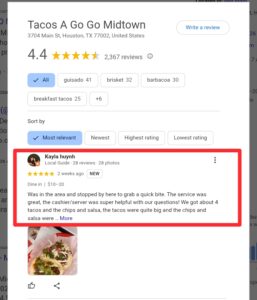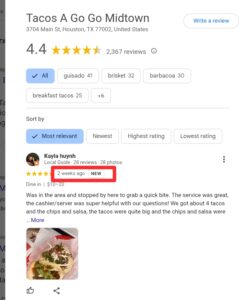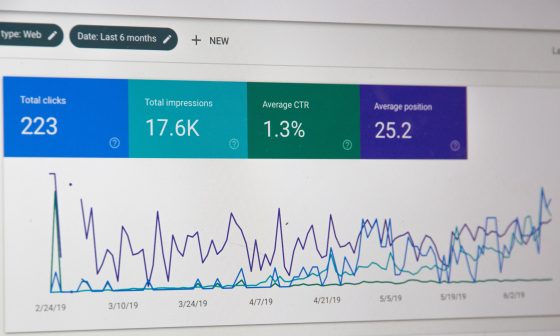Of course, online reviews are important. You know this already. But do you really need to follow every single little ‘rule’ you’ve read about to deal with them and make them work for you? Is it okay to reply non-committally, or better yet, not reply at all? Can you get away with waiting for good testimonials to come in instead of setting up a whole review form?
The short answer is yes. Online reviews, especially recent ones, can really move the needle for local SEO. While businesses often chase sheer volume and star ratings (that’s not to say they aren’t important), they overlook the power of freshness. Google’s local algorithm in 2025 is leaning heavily on signals that suggest a business is alive, active, and genuinely trusted by recent customers.
When you receive reviews on a daily, weekly, or monthly basis, they tell Google and potential customers that you’re still in the game, serving customers and delivering value today.
TL;DR: What is Review Recency and Does it Matter for Local SEO?
- Review recency refers to how recently a business has received a customer review.
- It matters because Google and customers trust businesses with recent reviews more than old ones.
- Aim for steady reviews. Get at least 2–4 new reviews monthly (more for busy sectors) to stay top-of-mind.
- Fresh reviews build trust. People check dates before reading, so recent feedback boosts credibility and conversions.
- Consistent requests work best. Avoid bursts; maintain a regular, predictable review flow to signal activity.
- Getting regular reviews helps local SEO. Recent reviews influence map pack rankings and make your business look active and reliable.
What Is Review Recency?
Review recency refers to how recently a business has received a customer review. It isn’t just about having one new review here and there but maintaining a steady flow. Think of it as your brand’s heartbeat online. When that beat is steady, it indicates life and activity. Google doesn’t hand out an exact “recency” cut-off date, but most SEO experts and local marketing professionals agree that reviews from the last 30 to 90 days carry the most weight.

It’s not just about the last review date either. There’s something called “review velocity,” which focuses on how often reviews come in. Regularly getting feedback indicates consistent service quality and ongoing customer interaction. This rhythm suggests your business isn’t sitting idle but is constantly engaging with new and returning customers.
Review recency matters across all major platforms, not just Google. Yelp and Facebook also highlight recent feedback, and users naturally gravitate toward businesses with fresh reviews. If someone checks out a restaurant and the latest review is from two years ago, trust drops immediately. If no review recency is combined with a lack of updates, it can indicate to Google, customers, and prospects that the business has simply closed its doors.
But a lively stream of reviews keeps your online reputation current and shows you’re still winning hearts (and wallets).

Why Review Recency Matters for Local SEO
Here’s where the rubber meets the road. Google showcases review recency directly in business listings. You’ve probably seen it yourself: the date a review was posted sits right below the reviewer’s name.

Source: Google
Users can even filter results by “Newest,” putting the freshest experiences front and center.
From an algorithm perspective, fresh engagement acts as a trust signal. Google uses it to gauge if a business is still active and meeting current standards. On the other hand, outdated reviews can make even the most established brand look stale or even closed.
Recent reviews signal three powerful things to both search engines and potential customers:
- The business is active and still operating.
- Customers are currently satisfied and recommending it.
- Information is up-to-date, reflecting current service or product quality.
Research supports this. Research on Search Engine Land shows that 85 percent of consumers think reviews older than three months are no longer relevant and disregard them. That’s huge. It shows people rely on recency to validate whether a business is still delivering on its promises. Google seems to agree and uses that rule in giving relevance to how searchers see reviews. After all, the most relevant review is often a “New” one.

If you help small to mid-sized multi-location businesses, you know local visibility is their lifeline. Encouraging them to collect steady reviews can make a serious difference in map pack rankings and local organic results.
Does Google Confirm This Signal?
While Google hasn’t stamped review recency as an official core ranking factor, there are plenty of clues pointing to its importance. Google’s own help docs mention that “high-quality, positive reviews can help your business stand out,” straight from the source.
It works like this: user behavior drives rankings indirectly. When customers see recent reviews, they’re more likely to click, call, or visit. Higher engagement levels feed positive signals back to Google’s algorithm, boosting local pack rankings and even organic visibility.
To keep a business listing fresh and inviting, here’s a quick step-by-step checklist you can share with your clients:
- Ask consistently. Encourage every satisfied customer to leave feedback immediately after their purchase or service.
- Make it easy. Provide direct links to the review platform or set up QR codes at physical locations.
- Respond publicly. Thank reviewers promptly to show future customers that the business values feedback.
- Spot trends. Watch for common themes in recent reviews to guide operational improvements.
- Stay proactive. Address any negative feedback quickly to prevent reputational damage from snowballing.
Check Out: How to Request a Review on Google: Strategies to Generate Positive Reviews
Businesses that follow this approach often see an upturn in both rankings and consumer trust. They’re simple but powerful habits that can outshine even large marketing budgets.
Remember, Google wants to serve users the best, most relevant results possible. A business with a lively review profile is seen as more credible and reliable. Plus, when a potential customer clicks “sort by newest,” you don’t want your client to vanish from the list.
How Often Should You Get New Reviews?
Businesses should aim for at least two to four new reviews each month.
For busy locations like restaurants, salons, and fitness centers, pushing for weekly reviews works even better. The main goal here is to avoid the dreaded “review silence.” You never want more than 60 days to pass without a new review landing on your profile.
If you’re in a competitive niche, like beauty or healthcare, weekly reviews can keep you ahead of local rivals. When reviews stop, it can signal to Google (and customers) that your business is inactive or struggling.
Consistency matters more than volume spikes. Avoid review bursts followed by long silences. Instead, build a steady rhythm of requests. Monitoring your reviews is like maintaining a healthy heartbeat for your brand.
How Review Recency Affects Trust and Conversions
Research shows nearly all online shoppers (over 99.9% of them) read reviews before transacting. And most check the date of a review before reading the actual feedback. Yes, old reviews can show consistency, longevity, and popularity. But even a five-star business listing can look suspicious if the reviews are two years old and none have been coming in recently.
Outdated reviews create doubt. People start asking themselves, “Has this place changed owners? Did they drop quality? Are they still open?” This is especially important in industries where service standards evolve quickly, such as healthcare, food and beverage, and retail.
Review recency acts as a living proof of credibility. When someone sees phrases like “just had a great visit” or “still amazing in 2025,” it sparks instant trust. Customers don’t want to gamble on an outdated reputation. They want proof that a business is still delivering excellent service today.
This psychological nudge plays a big role in turning window shoppers into actual customers. Fresh reviews reduce hesitation and encourage faster decisions, boosting conversions without big marketing expenses.
Conclusion
Reviews are like produce at a grocery store. Fresh is always better. No one wants to buy wilted lettuce, and no one wants to trust stale feedback either. Review recency or freshness is a ranking and trust currency. It improves local SEO performance and also makes customers feel secure. Adding it to your local SEO strategy is crucial. Pairing it with strong NAP consistency, regular content, and accurate citations will help you build a solid foundation.
Frequently Asked Questions
What is the meaning of recency in marketing?
Recency in marketing is all about how recently someone interacted with your business. If a customer visited or bought something last week, they’re more likely to remember you and come back soon. It helps businesses know who’s still paying attention and who might be slipping away. Staying top of mind is half the battle when it comes to repeat business.
Why is recency important?
People trust recent experiences way more than old ones. A review from yesterday feels relevant, while one from two years ago might seem outdated. This “recency effect” shapes whether someone decides to call, visit, or keep scrolling past. Fresh feedback reassures potential customers that your business is active and still doing a great job.
How many Google reviews do I need to increase my rating?
Most businesses can start making an impact with around five solid reviews if they’re in a quiet or niche market. But aiming for at least ten gives you a stronger cushion and builds more trust. The more reviews you get, the more confident new customers feel clicking that “Call” or “Directions” button. Just remember, steady and honest reviews matter more than hitting some number overnight.


